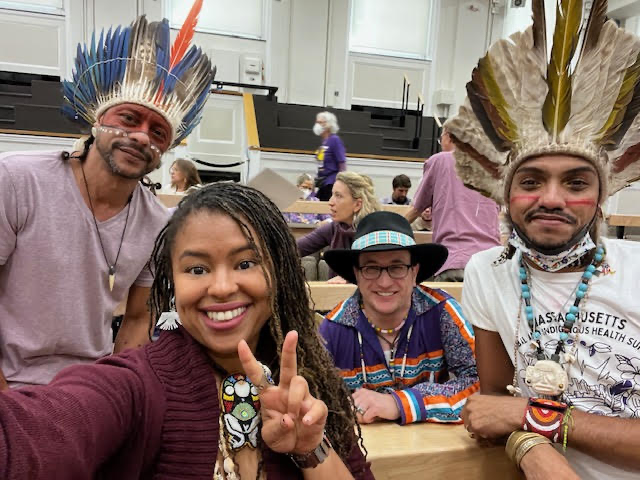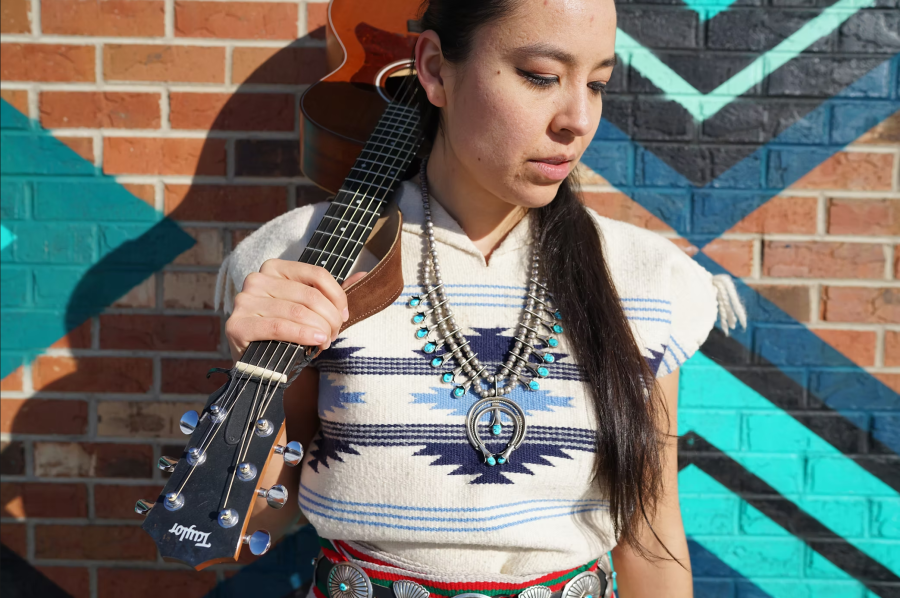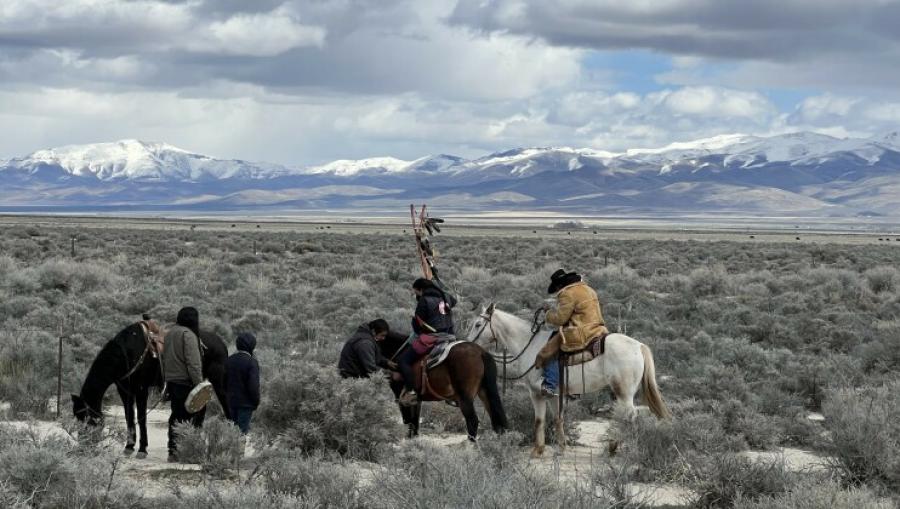
By Tia-Alexi Roberts (Narragansett, CS Staff)
In the United States, Indigenous Peoples Day is recognized by 30 states on the second Monday of October as an official holiday or via proclamation. In 2021, President Biden issued the first-ever presidential proclamation of Indigenous Peoples Day in addition to, though not as a replacement for, Columbus Day. In Massachusetts, more than 20 communities have replaced Columbus Day with Indigenous Peoples Day, yet the Commonwealth as a whole has not officially done so.
Advocacy efforts spanning decades have been dedicated to advancing this transformation. Among many groups and individuals, two coalitions, Indigenous Peoples Day MA and the Massachusetts Indigenous Legislative Agenda, of which Cultural Survival is a member, were present on October 3 at the Massachusetts State House at a hearing in support of Bill (S.1976/H.2989), which advocates for replacing Columbus Day with Indigenous Peoples Day. The two coalitions embody a collective initiative composed of diverse organizations and individuals who share a common dedication to advocating for Indigenous Peoples Day legislation in Massachusetts and coordinating related celebrations. These coalitions are active in the legislative processes within the state of Massachusetts.
“The recognition of Indigenous Peoples Day is a small step in the broader efforts for Indigenous rights and cultural understanding,” said Pamela Anikaili Rosario Pérez (Taino/Yoruba, Missoko Bwiti), a Massachusetts resident involved in the movement. Rosario Pérez delivered her testimony on October 3 at the hearing. Several Indigenous people from different Native communities gave testimonies in support of the bill alongside supporters from Italian-Americans for Indigenous Peoples Day, and other representatives that support the legislation.
By commemorating Indigenous Peoples Day, we recognize that colonization persists and continues to perpetuate oppression and violence against Indigenous Peoples and our sovereignty and self-determination. Ending the celebration of Columbus Day is a vital step toward disrupting these oppressive systems and shifting focus to recognizing, honoring, and celebrating Indigenous Peoples' knowledge, histories, cultures, traditions, and lands. It is also an opportunity to learn about the Peoples whose land we occupy and now call home and to take action in supporting the rights and sovereignty of all Indigenous Peoples.
The Indigenous Peoples Day MA coalition has established a collaborative partnership with Italian Americans for Indigenous Peoples Day who share their solidarity with the Native Peoples in Massachusetts and are dedicated to facilitating the transition to Indigenous Peoples Day. This group arose in reaction to Italian-Americans who defend Columbus Day, describing the change as “offensive to the Italian community” and contributing to the erasure of Italian-American history. “This bill basically disregards the contributions of Italian-American people—it’s offensive to so many across this commonwealth,” argued State Representative (D) Jeffrey Turco.
In response, Italian Americans for Indigenous Peoples Day states, “We believe that a holiday that celebrates the resilience of Indigenous peoples is far more truthful and uplifting than one that honors a man whose legacy is characterized by conquest, slavery, and genocide. We believe that any association with Christopher Columbus diminishes our culture and does not honor the struggles of our ancestors.”
As we consider the implications of this reframing, we are prompted to explore how it can contribute to raising awareness about Indigenous history, cultures, and issues. We look ahead with anticipation to see how the United States will continue to uphold these ideals and engage in actions that right historical wrongs, acknowledging and celebrating the rich history, cultures, and issues of Indigenous communities.
I recently spoke with Rosario Pérez, a Harvard University graduate, with a degree in Social and Cognitive Science, about the movement and her work.
Cultural Survival: What are your thoughts on the proposal to change Columbus Day to Indigenous Peoples Day?
Pamela Rosario Pérez: The change from Columbus Day to Indigenous Peoples’ Day is long overdue. I am grateful to Dr. Darlene Flores, one of the Taino leaders leading the charge in Massachusetts, and the numerous Indigenous Elders who have campaigned tirelessly to make this change happen at the state level. I am also immensely proud of the many Italian-Americans who have supported this effort and have taken the time to learn more about the significance of this change. It’s been an inspiring community-led movement.
CS: What are some of the historical and cultural reasons that the shift from Columbus Day to Indigenous Peoples Day is significant for Indigenous communities?
PRP: This shift is significant because 1492 is Taino history; it is my history. Columbus left Castile in August 1492 with three ships and made landfall in the Caribbean on October 12. He wasn’t sure where he would land and was actually lost for most of his trip. He thought he’d land in East Asia but he landed in the Caribbean. He first came upon a land that natives called Guanahani, an island in the Bahamas. He then visited the islands now known as Cuba and Hispaniola.
I understand that the voyages of Columbus are considered a turning point in human history marking the beginning of globalization as well as the demographic, economic, and sociopolitical changes that shape our world today. I understand that his explorations resulted in permanent contact between the Eastern and Western hemispheres, which is noteworthy. However, a truth that cannot be denied is that Columbus’s voyages initiated an era of subjugation, torture, rape, and colonization that lasted for centuries. Columbus is not only responsible for the almost complete annihilation of Hispaniola's Indigenous population—my ancestors—but he is also one of the originators of the transatlantic slave trade.
Columbus fell in love with the potential of my land and was quick to establish the first colony there. Columbus landed on my land in 1492. In less than four decades, slavery, abuse, rape, torture and disease outbreaks contributed to the near-annihilation of Taino people on Hispaniola. It is a miracle I am here today. I support the establishment of Indigenous Peoples Day because I call for the celebration of the resilience of my Taino and Arawak ancestors and the fortitude of Indigenous Peoples in the Americas instead of the atrocities of a man who was lost at sea for most of his expeditions.
CS: Some argue that changing Columbus Day might erase historical heritage. How would you respond to this concern? How can the transition be approached to preserve historical awareness?
PRP: I stand by teaching the truth. Lying helps no one. It may feel good momentarily, but lies have a way of hurting people in the long run. As painful as it may be, it is vital we learn from the past so that we can all participate in forging a better future. I understand why and how Columbus Day came about. I also call for the respect of Italian-Americans. Italian-Americans are a strong people. They’re a people with a rich history and a long list of heroes like Marco Polo, Leonardo da Vinci, and Michelangelo, who are more worthy of celebration than Christopher Columbus.
CS: In what ways do you think the renaming of this holiday can contribute to raising awareness about Indigenous history, cultures, and issues?
PRP: The renaming of this holiday may seem small, but it plays an important part in the advancement of Indigenous Peoples’ rights. The United States has stated its intention of championing equity, belonging, and inclusion for decades now, so I look forward to witnessing how they continue doing what is right by those who have been historically disenfranchised, marginalized, and kept from participating in the building of generational health and wealth.
CS: In your opinion, how can the renaming of the holiday contribute to fostering a more accurate and inclusive understanding of history in educational curricula?
PRP: In 2017, it was reported that Massachusetts was home to 918,565 Latinos, of whom 167,334, or approximately 18 percent, were Dominican. Dominican-Americans are one of the fastest growing groups in Massachusetts. To celebrate a monster that brought terror and wreaked havoc on our Indigenous ancestors not only creates a hostile environment, but it also stops our nation’s inclusivity and belonging efforts in its tracks.
I don’t have a ‘hope’ for the future; I have a ‘knowing.’ I know that people are waking up to the fact that it is important to teach history as it happened so that we don’t repeat the mistakes of the past. It is important that an accurate version of history is taught in our educational curricula, but also in all our major institutions from finance to healthcare to religion and everything in between. I am encouraged by the people from all creeds, cultures, and traditions collaborating and lifting each other up in this work. I appreciate the many allies advocating for us at [the tables where] Indigenous people are not yet welcomed. I see numerous Indigenous people getting organized and launching thoughtful campaigns to bring our people together as we fight a common enemy: ignorance. I am profoundly excited for what’s to come and the many changes that will take place to create a more equitable world.
CS: What initiatives or events do you think would be effective in promoting the importance of Indigenous Peoples Day, and how can communities actively engage in these celebrations?
PRP: My advice for anyone looking to support our community is attend Indigenous events year round. Attend Indigenous Peoples Day celebrations like my favorite, IPD Newton at Albemarle Field, but also attend celebrations, presentations, powwows, cookouts, competitions, and other Indigenous events year round. Indigenous Peoples are active, contributing members of mainstream society. They’re doctors, teachers, mechanics, business owners, and so much more. We’re not Indigenous on one day out of the year, we’re Indigenous every day. Every day that we live on occupied land, we should celebrate and uplift the Indigenous and Aboriginal people of the land we step on.
CS: Have you observed any positive impacts in communities that have already made the switch to celebrating Indigenous Peoples Day instead of Columbus Day?
PRP: Newton is a great example. Newton has become a much more open, welcoming, and warm place. I feel safe walking its streets with my Native American and African regalia, which was not the case before 2020. On November 2, 2020, the City of Newton voted to officially change Columbus Day to Indigenous Peoples Day. The 22-2 vote was the culmination of extended advocacy and grassroots efforts by Indigenous residents of Newton and allies. The Indigenous Peoples Day Newton Planning Committee was founded in late 2020, and on October 11, 2021, Newton held its first official Indigenous Peoples Day Ceremonial Celebration at Albemarle Field. Since then, each celebration has gotten bigger and bigger; each year, more people from different states and countries come down to join in intertribal celebration.
The joy that is cultivated by Indigenous Peoples’ Day celebrations transforms the land, it heals the land. Mother Earth has gone through so much pain. It brings a smile to my face to see her receiving love from our collective happiness when we come together.
Top photo: Pamela Anikaili Rosario Pérez (Taino/Yoruba, Missoko Bwiti), joined by fellow Indigenous activists at the Indigenous Peoples Day Hearing. All photos courtesy of Pamela Anikaili Rosario Pérez.
Second photo: Pamela Anikaili Rosario Pérez (Taino/Yoruba, Missoko Bwiti), photo taken by Rob Adelman (Wampanoag)



